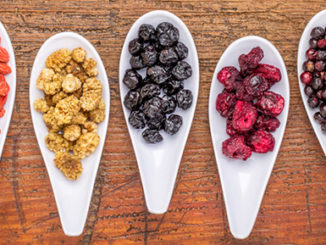Explore the many ways in which different types of food and drink have potential to influence epigenetic marks on DNA and, ultimately, health outcomes. Learn how broccoli may be able to epigenetically reduce cancer risk, how an assortment of herbs could boost health, and even the ways a high fat, low carb diet may be able to boost mental ability. This collection of cutting-edge nutriepigenetic research studies aims to break down complex dietary epigenetic findings and understand its potential application in our daily life.
Check out our comprehensive e-book Epigenetics in Life: What We Eat to learn more about how different foods influence health.
Muffins – not only are they delicious, but they offer valuable insight into how different foods we eat might alter our DNA. New research that builds off of the popular “muffin study” that was published a few years ago suggests that eating a certain type of fat may actually adjust marks on your DNA and contribute to the way your body stores fat. We often hear that saturated fat – found in butter, cheese, cream, chocolate, and sausage, for example [more…]
Whether we like it or not, we’re faced with many physical changes as we get older. Wrinkles form, bones and muscles grow weaker… even the way fat is distributed throughout the body changes radically. As we age, we lose a certain type of fat cell that burns fatty deposits, which increases the risk for obesity. But there may be hope. Interestingly, researchers are finding that an epigenetic enzyme might be able to prevent this pesky change from happening. Epigenetics has [more…]
Ginger root, or the rhizome of the flowering ginger plant (Zingiber officinale), has been cultivated for millennia for use as both a spice added to food as well as a tonic used to cure ailments. Though originating in southeast Asia, ginger was used extensively by the Romans up until the fall of the Roman Empire where it then began being more widely traded and slowly crept into homes around the world. Now, the field of epigenetics is delving into the [more…]
Casticin, a type of flavonoid, could adjust chemical tags on DNA to stave off gastric cancer, a recent study suggests. Found in wormwood and various fruits, including chasteberry and oil from the chaste tree, casticin is able to epigenetically impact the expression of a gene that inhibits stomach cancer. Although additional research and clinical studies are needed, the results hint that consuming a naturally occurring plant compound might fight tumor growth. Gastric cancer, often caused by an infection from H. [more…]
We often think that taking supplements is a good thing – but what if we consume too much? And could doing so negatively affect our children? Researchers from the German Center for Neurodegenerative Diseases (DZNE) found that fathers who consumed an excessive amount of certain supplements could epigenetically harm their offspring, affecting their children’s memory and learning ability. As we know, a mother has profound impact on her children and their development. Epigenetic research has shown that mothers can influence [more…]
A chemical in an essential oil extracted from tree bark might actually reduce cancer growth. Researchers are finding that hinokitiol, a compound found in some cypress trees, not only has anti-infective and anti-oxidative properties, but it might also impact the epigenetic tags on top of DNA and reactivate genes that fight against tumor growth. The epigenetic mechanism known as DNA methylation has been crucial to our understanding of cancer. Irregular methylation suppresses genes that work to reduce tumor growth, which [more…]
We’ve long known that what we eat affects the microbes in our bodies. Right now, hundreds of different species of bacteria are churning in our stomachs, working to protect us as well as survive within us. New research is showing that the bacterial microbiota of the gut could place chemical tags on our DNA and influence gene expression, potentially impacting our health and many aspects of our lives. Researchers have found that these microbes send out metabolites that impact epigenetic [more…]
Could eating less carbohydrates and more fat relax DNA and boost mental function? Researchers found that a ketogenic diet – consuming high amounts of fat, adequate protein, and low carbohydrates – increases an epigenetic agent naturally produced by the body. This, in turn, may improve memory defects and bolster the growth and development of nervous tissue. In a study published in PNAS, researchers looked at mice with a genetic alteration similar to one found in humans who suffer from a [more…]
Extra weight that you may have put on during the holidays could not only appear around your belly, but also add epigenetic tags to your DNA, suggests a new study. Having a high body mass index (BMI) was linked to additional methyl tags found at more than 200 areas on the genome, which affects gene expression and could predict susceptibility to some diseases like diabetes. “This issue is particularly relevant because an estimated one and a half billion people throughout [more…]
Could a certain type of sugar undo the failure of an individual’s immune system? New research suggests that immune cells can be restored in those with a compromised immune system using a sugar known as beta-glucan, which can turn on an epigenetic “control switch”. For many, getting an infection, such as a sinus infection, feels like an intensified, prolonged cold. Bacterial sinus infections are often easily combated with antibiotics, but typically resolve on their own. However, for more than a [more…]











